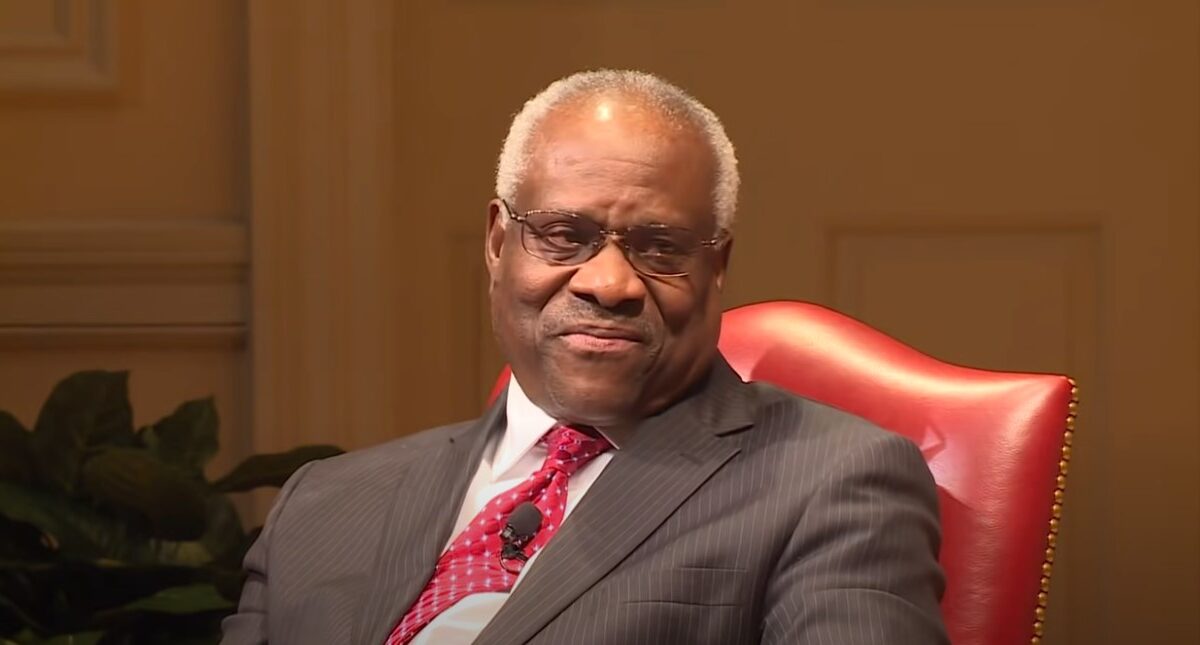Local leaders and state elected officials of Georgia rightly want to honor Supreme Court Justice Clarence Thomas with a statue on the state Capitol grounds to celebrate a native son who was born into poverty during segregation and now serves on the Supreme Court and is its most influential member. But because Justice Thomas is a principled black conservative, he triggers many Democrats into a rage, exposing their racism. Every Democrat state senator voted against authorizing this statute, and all their arguments opposing it are false.
Democrats claim Thomas’ views on issues are anathema to the black community. They say Anita Hill’s 1991 allegations of sexual harassment are disqualifying and complain that Thomas has failed to recuse himself from certain cases. And they insist it’s not appropriate to honor someone with a statue while they are living.
State Sen. Emanuel Jones made news last week by despicably calling Thomas an “Uncle Tom” because of his views and decisions that, according to Jones, betray his fellow black men to white people.
Thomas is indeed a ferociously independent thinker and has never bowed to any of these racist attacks. In 1998, when a retired left-wing, black federal judge tried to prevent him from speaking to the National Bar Association, the nation’s largest association of black lawyers and judges, Thomas responded in his speech by saying:
I have come here today not in anger or to anger, though my mere presence has been sufficient, obviously, to anger some. Nor have I come to defend my views, but rather to assert my right to think for myself, to refuse to have my ideas assigned to me as though I was an intellectual slave because I’m black. I come to state that I’m a man, free to think for myself and do as I please. I’ve come to assert that I am a judge, and I will not be consigned the unquestioned opinions of others.
The role of a justice is not to vote according to the popular will of the American people or a particular constituency. It is to interpret the law as written, regardless of who is before you.
In contrast to what is portrayed by black leaders and their allies in the media, a majority of black Americans actually agree with Thomas on most issues. On affirmative action, 59 percent of black Americans oppose any form of racial preference in college admissions. Democrats support racial preferences in higher education. On abortion, 81 percent of black Americans oppose third-trimester abortions, but Democrats want abortion on demand up to birth. Eighty-one percent of black parents support school choice, but the NAACP opposes school choice. And 69 percent of black Americans support voter ID laws despite Democrats insisting that requiring an ID to vote is racist. Prominent black leaders attack Thomas because he exposes how they are more in line with white leftists, who fund many of these powerful organizations like the NAACP.
When Anita Hill made her last-minute allegations during Thomas’ Supreme Court confirmation hearing in 1991, the overwhelming majority of Americans (by more than 2-1) did not believe her. Nearly everyone watched those hearings and judged the credibility of the witnesses, and they came to similar conclusions. Only 26 percent of women believed Anita Hill, and only 31 percent of black Americans believed her. Every one of her witnesses was not credible to support her charges, Thomas’ witnesses were credible, and her memoirs and her subsequent conduct make those points even more clear.
Even then-committee Chairman Joe Biden did not believe her. In fact, he called Thomas on the night he was confirmed to congratulate him, to tell him not to let the charges get him down, and told him he was a man of character. I know because I was there.
Hill used sexual harassment charges as a political weapon and admitted as much in a 1998 interview on “Meet The Press” with Tim Russert when she defended President Bill Clinton from credible sexual harassment and assault charges. (He later settled one of the cases.) Hill said she was willing to give Clinton’s behavior a pass based on his political views. She never said anything timely to hold Gov. Andrew Cuomo accountable, despite his harassing and assaulting scores of women, nor did she do anything meaningful to hold Biden accountable for Tara Reade’s allegations of sexual assault. Hill’s allegations were not credible, and she is not a credible spokeswoman.
The recent so-called ethics attacks on Thomas are another partisan double standard. Thomas has complied with all ethics and recusal laws to date. Democrats have invented new ethics “standards” after having no problem with liberal Justice Ruth Bader Ginsburg sitting on cases involving her lawyer husband’s law firm’s clients (and voting in favor of the client) and defending a liberal federal circuit judge sitting on a case involving a ban on same-sex marriages even though his spouse had spoken out against the ban and her organization had filed an amicus brief in the court below. And any criticisms about Jan. 6 are not serious, especially after the House Select Committee issued a comprehensive, 845-page report on the challenges to the 2020 election that did not mention Ginni Thomas once.
There have been many statues and buildings named after living people. Georgia dedicated a statue of former President Jimmy Carter in 1994 that is on the state’s Capitol grounds, and a statue of former President George H.W. Bush was dedicated in 2014 at his presidential library several years before he passed. There are more than 20 schools named after President Obama, five after President Clinton, and two after President George W. Bush. Justice Sonia Sotomayor even has a statue of herself in her hometown of the Bronx. There is nothing unusual or inappropriate about naming a school or dedicating a statue after a living person.
Thomas has led an inspiring and consequential life. He was appointed as our nation’s second black justice and is now the 12th longest-serving member of the court in history. He has written more than 700 opinions over his 30 years on the Supreme Court, setting forth an originalist jurisprudence that is principled and faithful to the Constitution. Many of his opinions are now the law of the land. He has been a mentor to many, most especially his law clerks, including Andrew Pinson, now a justice on the Georgia Supreme Court, and Bo Rutledge, the dean of the University of Georgia Law School.
But above all, Thomas is a kind and giving person. Here is what Sotomayor had to say about Thomas:
[W]e share a common understanding about people and kindness toward them. … That’s why I can be friends with him and still continue our daily battle over our difference of opinions in cases. Justice Thomas is the one justice in the building that literally knows every employee’s name, every one of them. And not only does he know their names, he remembers their families’ names and histories. He’s the first one who will go up to someone when you’re walking with him and say, ‘Is your son okay? How’s your daughter doing in college?’ He’s the first one that, when my stepfather died, sent me flowers in Florida. He is a man who keeps cares deeply about the Court as an institution, about the people who work there, but about people.
In a beautiful commencement address in 2008 at the University of Georgia, Thomas shared his advice to the graduates on how to live a good life: “First, show gratitude and appreciation. None of you, not one of you, made it here entirely on your own. … Help others as you wanted and needed to be helped. If you want to receive kindness, respect, and compassion, you must first give them.”
And he has never forgotten the importance of a helping hand when you are from a disadvantaged background. For years, Thomas has been very active in the Horatio Alger Association, an organization that, since 1984, has provided more than $245 million in college scholarships to more than 35,000 at-risk students. Every year, Thomas meets and spends hours with the students, providing advice and mentorship.
The state of Georgia should vote now to erect a statue to honor this Georgia native. In fact, I encourage state legislators and other leaders to read Thomas’ moving memoir, “My Grandfather’s Son,” or watch the fantastic documentary “Created Equal: Clarence Thomas in his Own Words,” or read the book of the same name (for which I am a co-editor). You will understand even more why Thomas should be honored with this statue.







